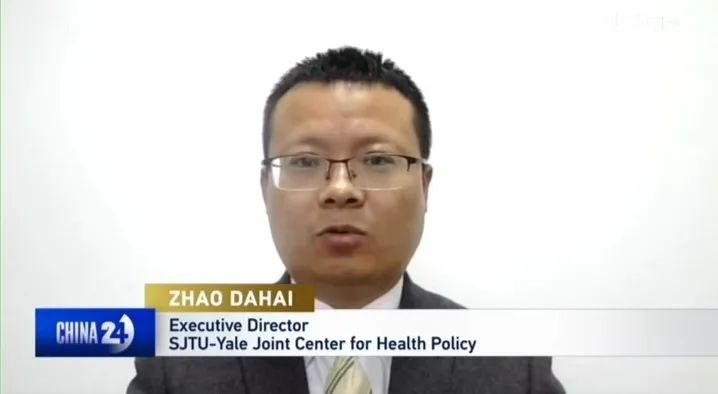上海交大赵大海接受央视专访:中国“厕所革命”对公共卫生和社会发展具有举足轻重的意义

上海交通大学国际与公共事务学院博士生导师、上海交通大学-耶鲁大学卫生政策联合研究中心执行主任赵大海,自新冠肺炎疫情暴发以来,对于新冠疫情暴发、防控以及卫生政策第39次接受中央电视台专访,也是第62次接受央视、上视专访。在2020年11月19日的“世界厕所日”,赵大海在中央电视台英语频道的《中国24小时》节目,就中国厕所改革的必要性、目的以及中国“厕所革命”未来的发展方向等话题进行了直播访谈。现将专访内容翻译并摘录如下。
主持人:为什么中国有必要推进厕所改革?背后的初衷是什么?
赵大海:首先,冲水马桶被称为是20世纪对人类影响最大的十大发明之一,它在改善人类生存环境方面发挥了无可替代的作用。如果没有厕所,当今的人类就不可能有干净的水。只有厕所,大量的传染病,如霍乱、痢疾、甚至是新冠肺炎,才有可能得到应对。其次,现在依然有大量中国人还生活在没有配备正规厕所的环境里。据统计,至少有30%的中国家庭没有配备正规的厕所。厕所已成为中国广大农村地区能否实现健康中国和新农村建设的重要标志之一。因此,推进我国厕所改革势在必行。进一步说,厕所改革的初衷正是为了提高全国公共卫生的整体水平。
主持人:近年来,中国一直在积极推动“厕所革命”。您认为已经做了足够的努力吗?如果不足够的话,还有哪些挑战和需要改进的地方?
赵大海:近年来,中国在“厕所革命”方面确实取得了巨大成就。然而,这还相当不够。首先,我国农村和城市之间存在着巨大的不平衡。在大多数城市地区,厕所已非常普遍;然而,在农村地区,至少30%的家庭依然没有厕所。第二,中国的“厕所革命”主要还处于相对较低的发展层次。实际上,从厕所出来的废水和污泥含有宝贵的水、营养物质和能量。“生态厕所”正是对从厕所出来的废物进行生产性再利用,以安全地促进农业发展,减少和收集排放物,以获得更绿色能源。这也就是今年世界厕所日的主题“可持续环境卫生与气候变化”的原因所在。因此,中国尚需要面对第二次厕所革命的挑战,即“生态厕所”和可持续发展的环境卫生。中国的“厕所革命”还有很长的路要走。
供稿者:国务学院
日期:2020年11月21日
Dahai ZHAO’s 62th comments on TV during the pandemic: China's "toilet revolution" is of great significance to public health and social development
Dahai Zhao, a doctoral supervisor at the School of International and Public Affairs of Shanghai Jiao Tong University and Executive Director of Shanghai Jiao Tong University-Yale University Joint Research Center for Health Policy, has been interviewed by CGTN for the 39nd time (the 62nd time by CGTN / ShanghaiTV) since the COVID-19 pandemic. On November 19, 2020, Zhao commented on the necessity and purpose of China's toilet reform and the future development of China's toilet revolution on “China 24” of CGTN.
Anchor: Why's the promotion of toilet reform necessary for China? What's the original intention behind it?
ZHAO: First, the toilet is known as one of the ten inventions that have the greatest impact on human beings in the 20th century, and has played an important role in improving the living environment of human beings. If there were without the toilet, it would be impossible for people to have the clean water. Only if there is a toilet, a large number of infectious diseases such as Cholera, dysentery, even COVID-19 can be tackled. Second, a large number of Chinese people live without access to safely managed sanitation. According to the statistics, at least 20% of Chinese people live without access to toilets. The toilet in rural areas of China has become one of the most important milestones whether the objectives of Healthy China and Rural Reconstruction of China have been realized. Therefore, it is really necessary to promote the toilet reform in China. Further, the original intention behind the toilet reform is to improve the overall level of national public health conditions.
Anchor: China has been actively promoting a "toilet revolution" during the recent years. Do you think enough efforts had been made? What are some challenge and areas to improve?
ZHAO: China has really made great achievements in the toilet revolution during the recent years. However, it is not enough. First, there is a huge imbalance between rural areas and urban areas. For the most majority of urban areas, the toilet is pretty popular; however, in rural areas, about 30% of families live without access to toilets.Second, China’s toilet revolution is at the low level of development of the safely managed sanitation. Actually, wastewater and sludge from toilets contain valuable water, nutrients, and energy. Sustainable sanitation systems make productive use of waste to safely boost agriculture and reduce and capture emissions for greener energy. This is why the theme of world toilet day in this year remarks the importance of "Sustainable sanitation and climate change". Therefore, China has to face the challenges of the second-wave of toilet revolution, the sustainable sanitation. There is still a long way to go for the toilet revolution in China.
Contributor: SIPA, SJTU
Data: November 21, 2020

